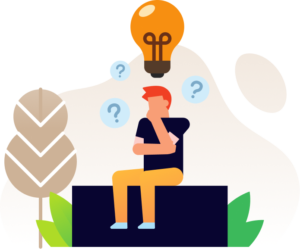


Breaking Barriers in Healthcare with AI
The Game-Changing Benefits for Patients and Providers.
Healthcare is one of the most complex and rapidly evolving sectors in the world, constantly looking for innovative ways to improve patient outcomes and provider efficiency. The advancements in technology have led to artificial intelligence (AI) becoming a game changer in the healthcare industry, changing the way healthcare professionals approach diagnosis, treatment, and patient care. By leveraging AI-powered tools and algorithms, treatment planning, diagnosis accuracy, and administrative efficiency can be improved. The possibilities for AI in healthcare are endless, from machine learning algorithms to chatbots that offer instant medical advice to prediction algorithms. This article explores AI's impact on healthcare, the benefits it brings to patients and providers, and how it is changing patient care.


AI is beneficial to healthcare in the following ways:
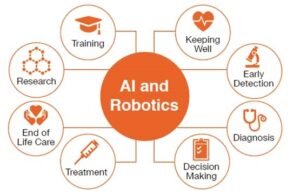
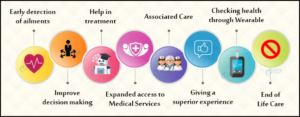
1. Increased accuracy and speed of diagnosis

Artificial intelligence can enhance diagnoses, leading to more accurate results and quicker recovery times. Within seconds, AI systems can analyse vast volumes of medical data, such as pictures, scans, and test results, and generate extremely accurate diagnoses. This is especially useful in fields like radiology, where AI may help detect early signs of diseases like cancer.
2. Personalized treatment plans
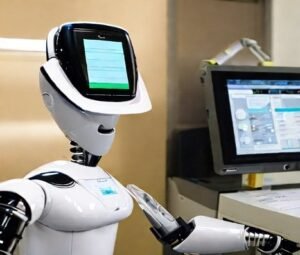
Based on patient data, AI can also help healthcare providers develop personalized treatment plans. AI algorithms can help doctors determine the most effective treatment options for specific patients.This is done by analysing patient data such as medical history, genetic information, and lifestyle factors. This allows physicians to give more personalized and effective care while improving health outcomes.
3. Early detection of disease
AI can potentially play a vital role in disease identification. AI algorithms can help physicians identify patients at high risk of certain diseases by analysing patient data. This can help doctors take proactive actions to prevent or treat disease at an early stage, improving patient outcomes.
# Examples of AI in healthcare: -
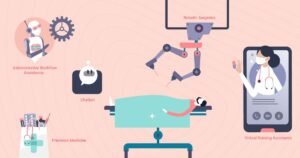
Although AI in healthcare is still in its early stages, there are multiple examples of AI being used to improve patient outcomes and provider efficiency. Here are some examples of artificial intelligence in healthcare:
1.Diagnosis:
AI is used to diagnose a range of diseases, from cancer to heart disease. For example, AI algorithms can analyse medical images such as X- rays and MRI scans to detect early signs of cancer. AI can also analyse electrocardiograms (ECGs) to diagnose heart disease.
2.Drug discovery:
AI is also used in medicine discovery. By analysing large amounts of data, including chemical structures and genetic information, AI algorithms can help identify potential drug candidates faster and more accurately than traditional methods.
3.Monitoring patients:
AI is also used to continuously monitor patients and alert healthcare providers to possible problems before they become critical. AI, for example, may monitor vital signs like heart rate and blood pressure and notify clinicians when problems are identified.
# AI and patient outcomes - fewer medical errors and better treatment plans: -
- AI improves patient outcomes by reducing medical errors and improving treatment plans. Medical errors can occur when healthcare professionals misinterpret data or make decisions based on incomplete information. AI can analyse data quickly and accurately, reducing error risk and enhancing patient safety.
- AI also improves treatment plans by developing personalized treatment plans for patients. AI can analyse patient data such as medical history, vital signs, and genetic information. This is done to create a comprehensive treatment plan based on the patient’s individual needs. This personalized treatment approach can lead to better treatment outcomes for patients.
- AI also improves patient outcomes by helping healthcare professionals predict readmissions. AI can analyse patient data, such as medical history and vital signs, to identify patients at risk of readmission. This early warning system can help healthcare professionals prevent readmission.
# AI and provider efficiency - streamlining administrative tasks and improving workflow
AI increases provider efficiency by automating administrative tasks, reducing paperwork, and creating more time for patient interaction. AI can help with scheduling appointments, managing patient records, and billing. Automation can reduce healthcare professionals’ administrative tasks, allowing them to focus more on patient care.
# Real-life success stories of AI in healthcare: -
1.Medical imaging and diagnostics:
Example: AI in Radiology – Deep learning algorithms analyse medical images such as X-rays, CT, and MRIs to accurately detect abnormalities. AI systems can help radiologists identify and classify diseases such as cancer, tumours, and cardiovascular disease with increased precision and speed.
One example is AI’s use in diagnosing diabetic retinopathy. Diabetic retinopathy is a diabetes complication that can lead to blindness. AI can analyse retinal images to detect signs of diabetic retinopathy so healthcare professionals can develop an effective treatment plan.
2.Precision medicine and personalized treatments:
Example: genomic analysis – AI algorithms analyse genomic data to identify genetic markers and mutations associated with specific diseases. This enables personalized treatment plans and targeted therapies based on a patient’s genetic profile, optimizing treatment outcomes, and minimizing adverse effects.
3.Predictive analytics and disease prevention:
Example: early detection of sepsis – AI algorithms analyse patient data, including vital signs, lab results, and electronic health records, to predict the likelihood of developing sepsis. Healthcare providers can intervene earlier and save lives and reduce healthcare costs through timely interventions.
Another example is AI’s use in predicting patient readmissions. AI can analyse patient data such as medical history and vital signs to identify patients at risk of readmission. This early warning system can help healthcare professionals prevent readmission.
4.Cancer detection:
AI algorithms have proven to be highly accurate at detecting early cancer detection features. For example, an AI algorithm developed by Google detected breast cancer with increased accuracy than human radiologists.
5.Monitoring patients:
AI algorithms are used to monitor patients in real time to alert healthcare providers to potential problems before they become serious. For example, an AI-powered monitoring system detects sepsis in patients, potentially saving lives.
6.Drug discovery:
AI algorithms have already been used to discover new drugs. For example, an AI algorithm developed by Insilico Medicine was used to identify a potential drug candidate for fibrosis.
Conclusion:
Artificial intelligence has the potential to transform healthcare by enhancing patient outcomes and provider efficiency. AI algorithms can assist healthcare providers to detect and treat diseases more efficiently by rapidly and accurately analysing massive amounts of data. This will help prevent medical errors while improving treatment strategies. AI can also help healthcare providers save costs and enhance efficiency by automating administrative activities and streamlining operations.
With continued innovation and collaboration between providers and technology companies, we can expect to see even more life-changing applications of AI in the years to come.
NOTE -
This article was entirely generated by AI using tools like:
#Edge Image Creator
#Stable Diffusion
#Write Sonic
#ChatGPT
#SpinBot
- This article is totally generated by AI. We don’t claim the authenticity and correctness of this article. It was generated as an experiment to test the potential of various AI tools.
- All the images in this article are AI generated.

